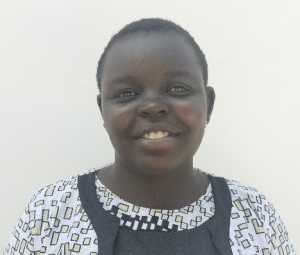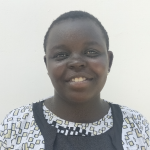January, 2022: ACK St. Luke's Shanderema Primary School Borehole Well Complete!
We are excited to share that ACK St. Luke's Shanderema Primary School in Kenya now has access to a new source of safe, clean water thanks to the completion of their new borehole well! Students and staff are already using the well’s flowing water, which will provide them with a reliable source of water for all of their daily needs.

We installed new latrines and handwashing stations for students, and we trained the school on improved sanitation and hygiene practices, including COVID-19 prevention. These components work together to unlock the opportunity for these students to live better, healthier lives.
Evaline, one of the school's students, explained how the new well will impact her life. "Access to safe and clean water will help reduce the time wasted during fetching water outside the school and minimize on diseases caused by contaminated water from the community that I used to drink before."

Evaline pumps water at the well.
Teachers were just as excited as the students about the new well on campus. "Access to reliable and safe water will help me so much," said Head Teacher Standslaus Mukola. "I will be able to drink safe and clean water. Also, I will be able to save time for teaching, since before much time was wasted during lesson time fetching water outside the school compound."

Standslaus washes his hands at the new well.
Standslaus also shared how the new water point will improve the school's outlook. "I will be able to start an agricultural farming program within the school. Funds from this farm will help the school purchase material for soap-making to improve the sanitation."
How We Got the Water Flowing
Parents, staff, and students all played a part in this well’s success. After determining the best site for the well through a hydrogeological survey, we obtained approval and a license through the government to begin drilling the new well.
To prepare for the project, the school helped collect fine sand and water for our artisans to use in making cement. When everything was ready and the students went home from class for the weekend (drilling is a very loud process!), our drill team and staff arrived at the school to begin work. A local pastor also led everyone in a prayer before the drill started.

The drilling process can take up to three consecutive days to complete due to this region’s hard bedrock, so when the drill team arrived, they set up a small camp where they could rest and refuel in shifts near the drill rig. The school’s kitchen staff and a few parents helped provide meals for the team, while the school provided a safe place for the artisans’ accommodations and materials. People of all ages came to watch the well’s progress throughout each day.

Drilling in progress, with spectators in the background.
Drilling commenced with excitement in the air. As the rig progressed, the team drove down a temporary casing to keep the walls from collapsing. We continued drilling to reach a final depth of 80 meters with a final static water level of six meters.
The team replaced the temporary casing with a permanent version and then bailed out the dirty water at the bottom of the well. They installed the pipes and flushed them, tested the well’s yield, and chlorinated the water.
Following chlorination, we constructed a cement well pad to seal off the well from any ground-level contaminants. The pad includes tiles beneath the drawing area to help protect the cement from the erosive force of the water, and a short drainage channel to carry spilled water away from the pump, preventing standing water at the access point. At the end of the drainage channel, we also dug a soak pit that helps absorb the runoff into the ground, further eliminating stagnant water.

When the well pad was dry, we installed a new stainless steel AfriDev handpump and took a water quality test to send to a government lab. The results came back announcing that this water is safe for drinking!

When the students and teachers arrived back at school, their enthusiasm for this much-anticipated project was overwhelming. We officially handed over the new borehole to the school.

Students and staff celebrated the presence of clean water on campus. The event was an excellent chance for us to acknowledge the school administration and students as the primary parties entrusted with the tools we have given and remind them of our continued support as they develop. Happiness, thanksgiving, and appreciation were the order of the day, flowing in all directions.
VIP Latrines

This project funded the installation of six new ventilated improved pit (VIP) latrines, three for the girls and three for the boys. These new latrines have cement floors designed to be easy to use and clean, locking doors for safety and privacy, and vents designed to keep air flowing up and out through the roof. With a rain tank right on school property, there should be enough water to keep them clean.
Handwashing Stations

The two handwashing stations were set up during training and handed over to the student health club. These were placed outside of the girls’ and boys’ latrines to encourage handwashing after latrine use. Health club members will teach other students how to wash their hands at the stations properly, make sure the stations are filled with water, and ensure that there is always a cleaning agent such as soap or ash available.
New Knowledge
We scheduled hygiene and sanitation training with the school’s staff, who ensured that the training date would be convenient for pupils and teachers. When the training day arrived, facilitators Joyce Naliaka, Laodia Chebet, and Julius Mwarema deployed to the site to lead the event. 12 students (two from each grade) attended the training, which we held in an unused classroom.

We focused on COVID-19 prevention, transmission, and symptoms while also covering several other topics. These included personal hygiene such as bathing, oral hygiene, and the ten steps of handwashing; environmental hygiene; child rights; operation and maintenance of the rain tank, latrines, and handwashing stations; and leadership and governance. During the latter, the students elected their peers to lead their newly formed student health club.
The club will be significantly involved in the water, sanitation, and hygiene project management at school. It will be responsible for encouraging good health and hygiene practices amongst their peers, teachers, and the larger community.

We involved stretches, dances, and physical activities between each topic to keep the pupils’ energy up and their minds active. By the end of the training, each pupil understood their role in sustaining clean water and good health within their school community.
One of the most memorable topics was personal hygiene. When the facilitator asked everyone how often they bathe, 13-year-old Duncan S. said he like his friends only bathe three times a week at most, while the girls in the class bathe twice a day.

Duncan after the training.
"The training was of much value to me since now I have learned to practice proper hygiene and sanitation, especially washing my clothes and ensuring I maintain cleanliness of my body by bathing and brushing my teeth," Duncan explained.
"Now that training has been completed, [I] have acquired new knowledge from the trainers," said 12-year-old Salima S. "I will educate my friends and family on the importance of proper mask-wearing and social distancing in crowded places."
We asked Salima what it was like to be at home for most of the last year due to Kenya's national coronavirus-related school closures and what it has been like coming back to school.
"I was so much affected by the school closure due to COVID-19 since I could not study well at home," Salima said. "All my time was spent assisting my parents and taking care of my siblings, thus I forgot everything that I had learned before this pandemic. I missed my friends and teachers so much, that I would hide in my room and pray to God to forgive and heal our land every day."
But now that Salima is back at school, she's been doing a lot better. "I feel so happy and ready to learn new things from teachers," Salima concluded. "I am also excited to be with friends play and share ideas and stories."
"Now that this water point is complete, I am planning to be [an] active member of the [health] club, to learn more about agriculture and also educate my friends and family on [the] importance of water handling," Evaline concluded.
When an issue arises concerning the well, the students and teachers are equipped with the necessary skills to rectify the problem and ensure the water point works appropriately. However, if the issue is beyond their capabilities, they can contact our field officers to assist them. Also, we will continue to offer them unmatchable support as a part of our ongoing monitoring and maintenance program.
Thank you for making all of this possible!


 Borehole Well and Hand Pump
Borehole Well and Hand Pump
 Rehabilitation Project
Rehabilitation Project






































